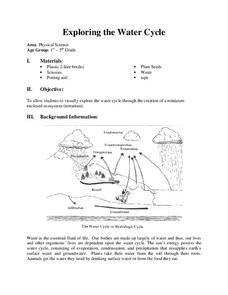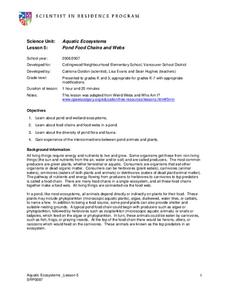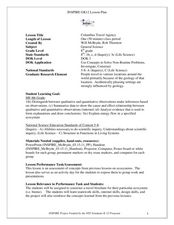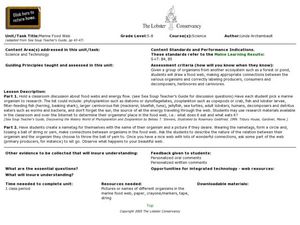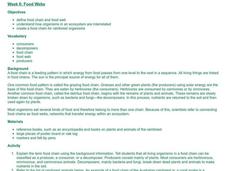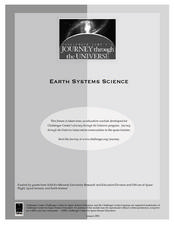Curated OER
Exploring the Water Cycle
Students investigate the water cycle. In this water cycle lesson, students create an ecosystem within a 2-liter bottle. Students record scientific observations as they observe the water cycle within their ecosystem.
Curated OER
The Gaia Hypothesis: An Approach to Problem Solving in the Environment
Students are introduced to the Gaia hypothesis by examining a conceptual sketch. In groups, they analyze the way they can use Dewey's method for problem solving to solve problems within the environment. They are given a problem facing...
Forest Foundation
Fire - How Does it Relate to You?
Forest fires can be a necessary step in keeping a forest healthy, but what happens when they get out of control? Learners investigate the causes and effects of forest fires in two specific areas, culminating in a report about the ways...
Polar Trec
Arctic Smorgasbord!
Two blooms of phytoplankton, instead of just one, now occur in the Arctic due to declining sea ice, which will have widespread effects on the marine life and climate. In small groups, participants build an Arctic food web with given...
Curated OER
The Consequences of Extinction
Students participate in a class discussion on site of an older style bridge to help connect the significance of each organism in an ecosystem by using an analogy of bolts slowly being removed from a working bridge.
Curated OER
Aquatic Ecosystems
Students study ponds and wetland ecosystems and examine the food chains and webs in them. In this aquatic ecosystems lesson students answer questions about the diversity of the flora and fauna in a pond.
NASA
Biology Training Conclusion
Gravity is just one consideration when determining human habitability on a new planet. The instructional activity connects four different units and starts with connecting the various systems: planetary systems, human body systems, etc....
Curated OER
The Living Environment
Students explore the cycles of an ecosystem. For this environmental science lesson, students work in groups to research the nitrogen cycle, the water cycle, or the oxygen-carbon dioxide cycle. Students prepare a PowerPoint or other...
Curated OER
Habitat survival
Sixth graders study different environments and how the food chain affects the survival of different animals. In this environments lesson plan, 6th graders share the visuals which describe the characteristics of the environment that they...
Curated OER
Columbus Travel Agency
Eighth graders research about their chosen ecosystem. In this life science lesson, 8th graders play the role of travel agents and create a travel brochure. They share this in class.
Curated OER
A Walk in the Woods
Eighth graders observe and identify the different levels of the forest. In this forest zones lesson students observe, identify and name a variety of forest components and describe how humans impact the forest ecosystem.
Curated OER
Marine Food Web
Young scholars investigate the effects of the food chain on all animals by creating a food web. In this seafood instructional activity, students discuss energy flow and research a specific marine organism of their choice. Young...
Curated OER
Circle of Life
Students consider why we eat and where our food obtains its energy. They illustrate food chains that might be found on an open field, dissect owl pellets, identify the remains of animals in the pellets, watch videos and participate in...
Curated OER
Field Crops in the Agro-ecosystem
Ninth graders explore how to apply ecological analysis to cropping systems. In this agro-ecosystem lesson students study management practices including soil and fertility.
Curated OER
The Biosphere
In this biosphere worksheet, students identify the different levels of organization that ecologists study. Students complete charts, sentences, and answer short answer questions.
Curated OER
Food Webs
Students research rainforest animals and use that information to make a flow chart to show the order in which energy is transferred through several organisms. They label the producers, consumers, and decomposers in their chart.
Curated OER
The Portable Niche
Third graders, in groups, research animals, plants, and conditions found in ecosystems.
Curated OER
Oh Panther
Pupils play a game that replicates the balance of prey and predators in an ecosystem. In this physical education lesson, students follow the instructions to play "Oh Panther!" Pupils collect data regarding the game and discuss the...
Curated OER
Understanding Interactions Among Local Species and the Local Environment
Students examine the differences between biotic and abiotic factors, explain the difference between habitat and niche and compare how organisms get their nutritional needs. In this local environment activity students trace the path of...
Curated OER
Earth Systems Science
Students perform experiments designed to grow plants and bacteria in a controlled environment. In this ecosystems lesson plan students investigate varying conditions for growing plants and bacteria.
Curated OER
Biomes
In this biomes learning exercise, students review the characteristics of aquatic biomes and terrestrial biomes. This learning exercise has 12 fill in the blank, 6 multiple choice, and 4 short answer questions.
Curated OER
The Rainforest Community
Students create a miniature rainforest ecosystem, a terrarium. Students then explain how the continuous flow of energy and food in the ecosystem allows it to sustain itself.
Curated OER
Food Chains & Food Webs
Students examine the concepts of food chains and food webs. They trace back common food chains found in nature, demonstrate the interdependence of organisms through a food webbing activity, and analyze the flow of the food chain of a...
Curated OER
Dirty Decomposers
Students explore the ecosystem by conducting a ziploc bag experiment. For this recycling lesson, students identify decomposer organisms in our environment and how they speed up the recycling process. Students utilize a ziploc plastic...


